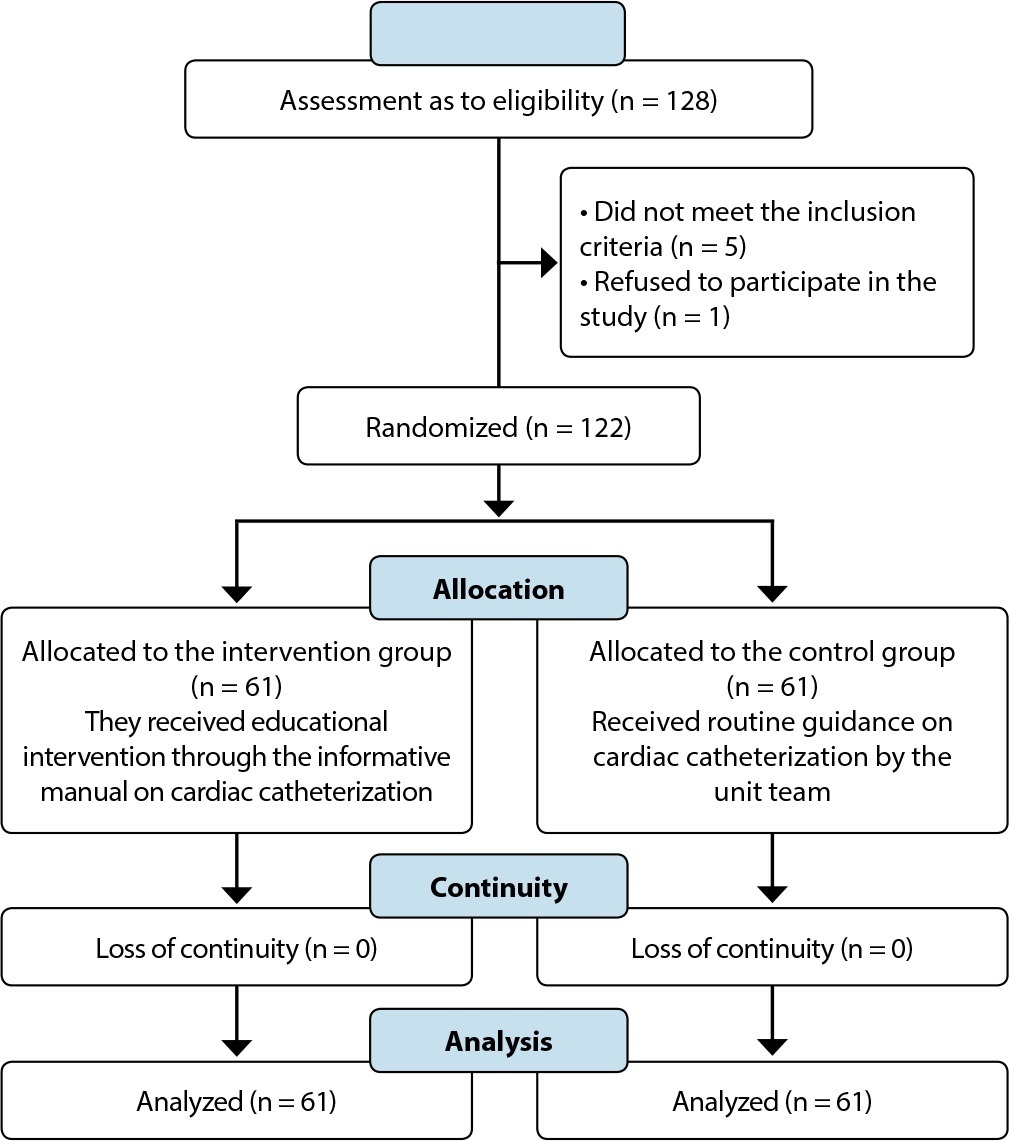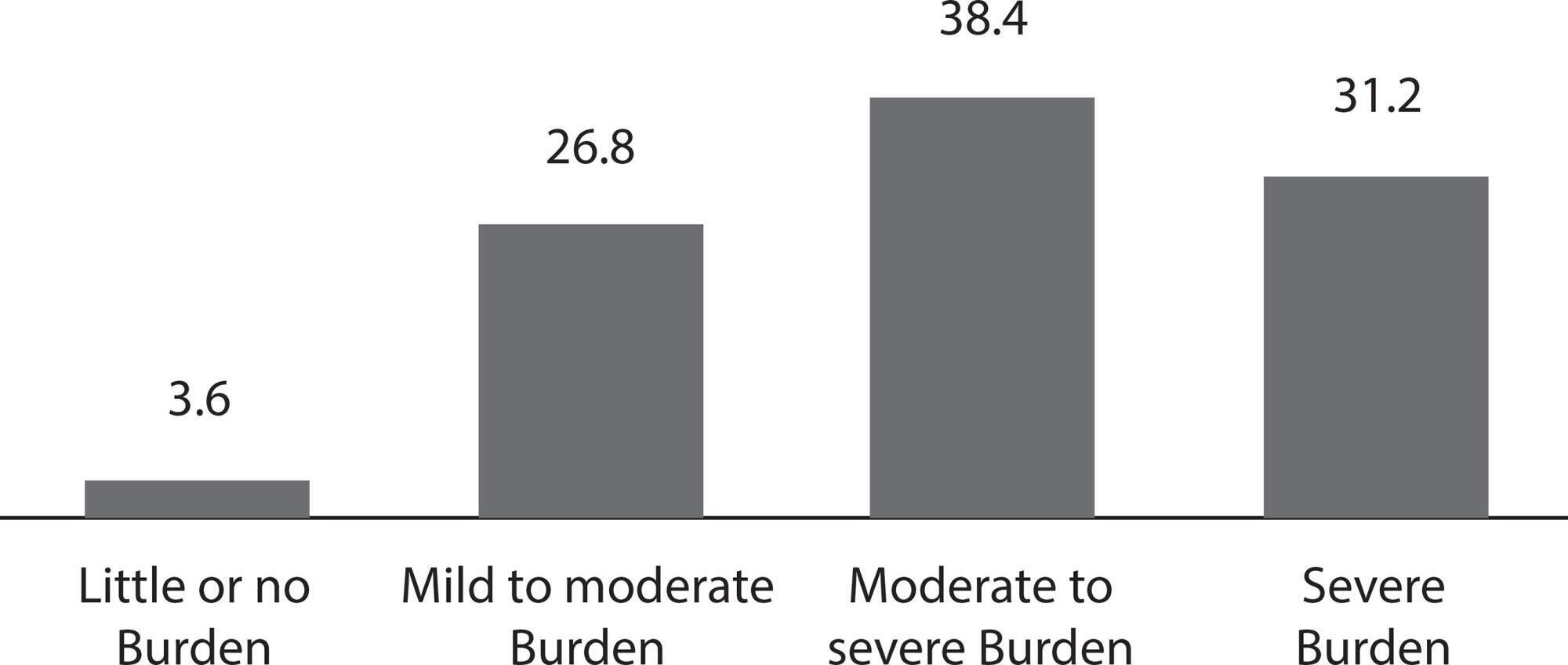-
ORIGINAL ARTICLE
Effectiveness of educational intervention with manual for anxiety and stress reduction: controlled clinical trial
Revista Brasileira de Enfermagem. 2022;75(suppl 3):e20210757
09-05-2022
Resumo
ORIGINAL ARTICLEEffectiveness of educational intervention with manual for anxiety and stress reduction: controlled clinical trial
Revista Brasileira de Enfermagem. 2022;75(suppl 3):e20210757
09-05-2022DOI 10.1590/0034-7167-2021-0757
Visualizações0ABSTRACT
Objective:
To evaluate the effectiveness of the educational intervention through an informative manual in reducing anxiety, stress, and changes in vital signs in patients awaiting cardiac catheterization.
Methods:
Parallel, randomized, controlled, blind clinical trial. The study excluded patients waiting for cardiac catheterization; those who received the information manual were randomized to the intervention group, and those who received routine information from the unit went to the control group. The study used the State Anxiety Inventory and Perceived Stress Scale and the ANOVA test to analyze the outcomes between the groups. Clinical Trials .
Results:
There was no change concerning time, first and second moment (anxiety, P=0.225; and stress, P=0.696), interaction (anxiety, P=0.183; and stress, P=0.444), or groups, control, and intervention (anxiety, P=0.341; and stress, p=0.624).
Conclusion:
Although the educational intervention performed did not have an impact on the reduction of anxiety and stress, this type of intervention should be maintained for greater comfort and safety of patients and family members.
Palavras-chave: AnxietyCardiac CatheterizationControlled Clinical TrialProspect for Patient EducationPsychological StressVer mais
-
ORIGINAL ARTICLE
Music in the relief of stress and distress in cancer patients
Revista Brasileira de Enfermagem. 2021;74(2):e20190838
05-21-2021
Resumo
ORIGINAL ARTICLEMusic in the relief of stress and distress in cancer patients
Revista Brasileira de Enfermagem. 2021;74(2):e20190838
05-21-2021DOI 10.1590/0034-7167-2019-0838
Visualizações0Ver maisABSTRACT
Objectives:
to evaluate the effects of music on the physiological stress and distress of cancer patients being treated in a hospital.
Methods:
quasi-experimental study carried out with cancer patients hospitalized in the nursing wards of a public hospital. There was a single 15-minute intervention using music. It was individual, and headphones were used for patients to listen to three songs chosen by each one. The levels of stress and distress were measured before and after the intervention, using music to analyze the cortisol in the saliva and the answers to the distress thermometer. The significance level of the statistical analysis was 5%, using the non-parametric Wilcoxon test.
Results:
the mean age of the 26 patients was 56 years old. Most were female, white, and had breast cancer. After intervention, there were statistically significant diminutions in both stress and distress — p < 0.001.
Conclusions:
the use of music diminishes the stress and the distress of cancer patients.

-
ORIGINAL ARTICLE
Understanding prejudice of psychic suffering individuals about sexuality
Revista Brasileira de Enfermagem. 2020;73(2):e20190270
03-30-2020
Resumo
ORIGINAL ARTICLEUnderstanding prejudice of psychic suffering individuals about sexuality
Revista Brasileira de Enfermagem. 2020;73(2):e20190270
03-30-2020DOI 10.1590/0034-7167-2019-0270
Visualizações0Ver maisABSTRACT
Objectives:
to understand the conceptions of individuals in psychological distress about their sexuality.
Methods:
qualitative study held at a Psychosocial Care Center. Fifteen people assisted in the service participated. A semi-structured questionnaire and script with identification data survey and guiding questions were applied. Data were analyzed by Content Analysis.
Results:
the following categories emerged: Prejudice of assisted people regarding homosexuality; Prejudice of assisted people regarding the expression of sexuality and the social context; Prejudice to the affective relationship among people assisted in CAPS; Prejudice of people assisted in the expression of female sexuality; Prejudice of society to the sexual orientation of assisted people.
Final considerations:
sexuality understanding showed that these are conceptions linked to prejudice and stigma of society. Although sexuality was present, it is clear that it was surrounded by taboos, myths and value judgments, in which the only way to deal with it was through repression.
-
ORIGINAL ARTICLE
Burnout assessment in nurses from a general emergency service
Revista Brasileira de Enfermagem. 2019;72(6):1457-1463
10-21-2019
Resumo
ORIGINAL ARTICLEBurnout assessment in nurses from a general emergency service
Revista Brasileira de Enfermagem. 2019;72(6):1457-1463
10-21-2019DOI 10.1590/0034-7167-2017-0870
Visualizações0Ver maisABSTRACT
Objective:
To assess the level of Burnout among nurses in a general emergency department.
Method:
Quantitative, descriptive, correlational and cross-sectional study. 32 nurses from a general adult emergency department answered a questionnaire to evaluate Burnout. (Copenhagen Burnout Inventory).
Result:
It was verified that 59.4% of the nurses presented total Burnout. Work-related burnout was the subscale with the highest average score. It was found that the lower the age and the longer the time working in the institution, the higher the level of Burnout. Longer professional experience was related to lower levels of Burnout. There were also higher scores of Burnout among participants who thought about changing their profession, their institution or their service.
Conclusion:
The prevalence of Burnout is high. Professional Burnout was the most critical subscale. Age and the current work are the subscales that most influence perceived Burnout
-
ORIGINAL ARTICLE
Caring ability, burden, stress and coping of family caregivers of people in cancer treatment
Revista Brasileira de Enfermagem. 2019;72(6):1541-1546
10-21-2019
Resumo
ORIGINAL ARTICLECaring ability, burden, stress and coping of family caregivers of people in cancer treatment
Revista Brasileira de Enfermagem. 2019;72(6):1541-1546
10-21-2019DOI 10.1590/0034-7167-2018-0605
Visualizações0Ver maisABSTRACT
Objective:
To analyze the association between the caring ability and the burden, stress and coping of family caregivers of people in cancer treatment.
Method:
A cross-sectional study with 132 family caregivers. The following instruments were applied: a characterization instrument, the Caring Ability Inventory, the Zarit Burden Interview, the Perceived Stress Scale, and the Brief COPE. The Spearman Correlation was used with significance ≤5%.
Results:
There were significant and positive correlations between total caring ability and: burden - interpersonal relationship (p=0.03); stress (p=0.02) and maladaptive coping (p=0.00); and inversely proportional correlations with problem-focused coping (p=0.03). The courage had inversely proportional correlation with: self-efficacy (p=0.03), interpersonal relationship (p=0.00), stress (p=0.04) and maladaptive coping (p=0.00). The knowledge had significant and positive correlation with problem-focused coping (p=0.00), adaptive coping (p=0.01), and inverse correlation with stress (p=0.02).
Conclusion:
The level of caring ability correlates with levels of stress and burden, and with the type of coping strategy used by family caregivers.
-
ORIGINAL ARTICLE
Caregiver burden and stress in psychiatric hospital admission
Revista Brasileira de Enfermagem. 2019;72(6):1699-1706
10-21-2019
Resumo
ORIGINAL ARTICLECaregiver burden and stress in psychiatric hospital admission
Revista Brasileira de Enfermagem. 2019;72(6):1699-1706
10-21-2019DOI 10.1590/0034-7167-2018-0832
Visualizações0Ver maisABSTRACT
Objective:
to evaluate the relation between sociodemographics factors, stress and burden of care of family caregivers of patients at a psychiatric hospital admission.
Method:
quantitative study, with a cross-sectional correlation design. A total of 112 family caregivers participated, older than 18, in a Brazilian psychiatric hospital. A sociodemographic questionnaire was used to collect data, the Zarit Burden Interview and LIPP Adult Stress Symptom Inventory.
Results:
burden of care in family caregivers at a psychiatric hospital admission was significantly associated with stress (p=0.000). The psychological symptoms of stress predicted severe burden. Most caregivers presented a moderate or severe burden, with 52.7% in the resistance phase of stress; 66.1% presented psychological symptoms.
Conclusion:
results show the alarming situation of caregivers of patients from a psychiatric hospital, evidencing their own vulnerability to illness. Indeed, the during admission in a psychiatric hospital, not only patients need care, but also their caregivers.

-
ORIGINAL ARTICLE
Suffering and defense in work in a mental health care service
Revista Brasileira de Enfermagem. 2019;72(4):903-909
08-19-2019
Resumo
ORIGINAL ARTICLESuffering and defense in work in a mental health care service
Revista Brasileira de Enfermagem. 2019;72(4):903-909
08-19-2019DOI 10.1590/0034-7167-2018-0140
Visualizações0ABSTRACT
Objective:
to know the suffering and the strategies of defense of CAPS AD III workers, from the perspective of the Work Theater proposed by Dejours.
Method:
a descriptive qualitative research, of the case study type, with CAPS AD III workers, using as theoretical framework the Psychodynamics of Work.
Results:
CAPS AD III professionals identify that the suffering in the work arises from the frustration between the real and the prescribed one; by the hegemony of practices guided by the biomedical model; stigmatization and prejudice with users; and the limitations of the Health Care Network (Rede de Atenção à Saúde). As an individual defense strategy, the rationalization was defined, and as a collective strategy, the protection strategy.
Final considerations:
worker uses strategies of defenses to face suffering and give a new meaning to it, characterizing themselves as ways of apprehending, understanding and giving meaning and new looks to their work.
Palavras-chave: Adaptation, PsychologicalHealth ServicesMental HealthOccupational HealthPsychological StressVer mais



